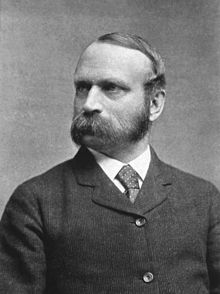Charles F. Chandler
| Charles F. Chandler | |
|---|---|

Charles F. Chandler
|
|
| Born |
December 6, 1836 Lancaster, Massachusetts |
| Died | August 25, 1925 (aged 88) |
| Nationality | United States |
| Fields | Industrial Chemistry, Public Health |
| Institutions | Union College, Columbia University |
| Alma mater | Lawrence Scientific School, Harvard University; University of Göttingen |
| Doctoral advisor | Friedrich Wöhler |
| Notable awards | Gold Medal of the National Institute of Social Sciences Perkin Medal (1920) |
| Signature | |
Charles Frederick Chandler (December 6, 1836 – August 25, 1925) was an American chemist, best known for his regulatory work in public health, sanitation, and consumer safety in New York City, as well as his work in chemical education—first at Union College and then, for the majority of his career, at Columbia University, where he taught in the Chemical Department, the College of Physicians and Surgeons, and served as the first Dean of Columbia University's School of Mines.
Charles Frederick Chandler was born in Lancaster, Massachusetts on December 6, 1836. His family moved shortly after his birth to New Bedford, Massachusetts, where he spent most of his formative years and engaged in his earliest formal education. As a child he devoted nearly all of his free time to scientific and geological explorations and attending public lectures on scientific subjects. These public lectures at the New Bedford Lyceum, and in particular a series of lectures given by the geologist and naturalist Louis Agassiz, sparked his lifelong interest in science. He was particularly interested in mineralogy and collected rock and mineral samples that he found around his grandfather's Lancaster home.
Upon completion of his studies at New Bedford High School, Chandler spent a year in private study, learning Latin and Greek and conducting chemical experiments in a laboratory he set up in his father's attic to prepare himself for more advanced chemical study. He then left his home in New Bedford and enrolled in the Lawrence Scientific School of Harvard University. While at Harvard he studied Industrial Chemistry, but he was encouraged to continue his studies in Industrial Chemistry and Geology in Germany, which was at the forefront of scientific education at the time. He enrolled in the University of Göttingen in 1854 to study with Friedrich Wöhler, and after studying under Wöhler and working as an assistant in the lab of Heinrich Rose, the father of analytic chemistry, he earned his PhD from the University of Göttingen in 1856.
...
Wikipedia
